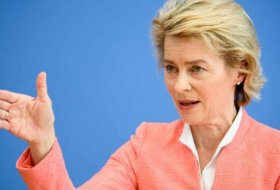The Royal Institute of International Affairs, known as Chatham House, says new high-tech foodstuffs will be vital to the EU meeting its goals on climate change, human health and drug resistance.
Animal agriculture is a significant driver of carbon dioxide emissions, through deforestation when swathes of land are used instead to grow feed crops for livestock.
According to the UN Food and Agriculture Organisation, livestock accounts for 14.5 per cent of global emissions.
Raising meat animals on farms is also a significant source of methane, which is about 20 times more potent than carbon dioxide.
The report recommends that policymakers write new regulations on labelling and product naming, and invest in research and development of lab-grown meat.
It also says EU chiefs should prioritise development of the “meat analogues” industry – lab-grown meat and plant-based food that resembles meat.
Lab-grown meat – dubbed “clean” meat – is made without killing animals, but by taking a muscle sample from an animal, collecting stem cells and growing them into muscle tissue.
Backing a change to such a diet would “play a vital part in addressing the detrimental climate, animal welfare and public health impacts of unsustainable meat consumption”, according to experts.
Demand for plant-based “meat” is already growing, with a global market for such products worth 4.08 billion euros last year.
Investment in the technologies so far has been driven by start-ups.
Laura Wellesley, of Chatham House, said: “The EU has been a hotbed of innovation in plant-based ‘meat’ and cultured meat. If it wants to reap the rewards of that innovation, policymakers need to respond now to the challenges and opportunities that this new industry presents.
“Innovation in plant-based meat and cultured meat could help the EU to deliver on some of its most ambitious policy priorities.”
Legal challenges to such meat substitutes are expected based on the 2017 European Court of Justice ruling that plant-based foods cannot be sold using terms such as milk, butter or cheese.
Eleonora Evi MEP said: “Our food system is contributing to an environmental and climate catastrophe and excessive meat consumption is the key factor. It is our responsibility, as decision-makers, to reverse this trend.
“Meat analogues have the potential to become a powerful ally.”
The Independent
More about: climatechange
















































